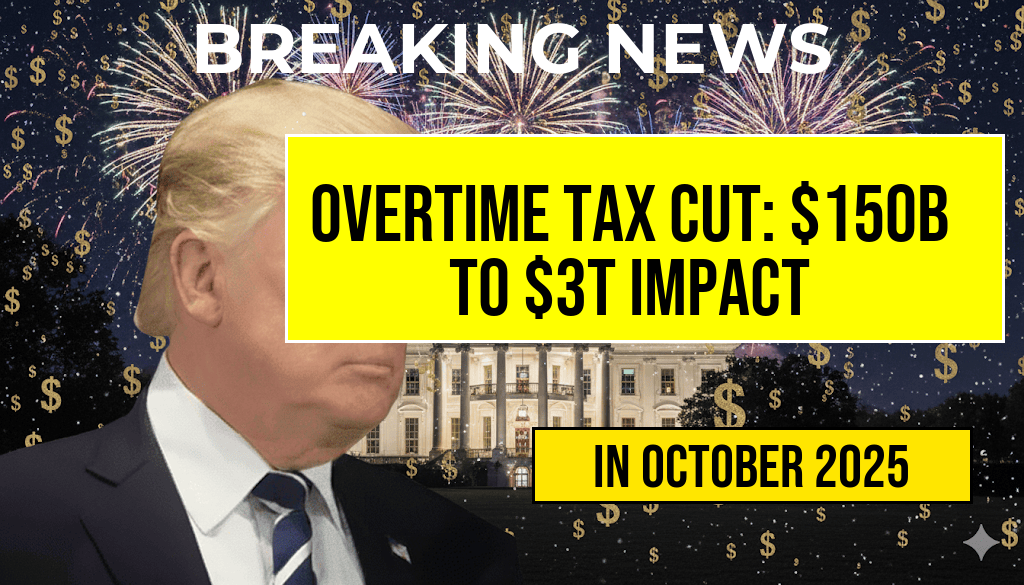The ongoing debate over proposed tax reforms has ignited discussions surrounding the potential implications of an overtime tax cut, which could cost the federal government between $150 billion and $3 trillion. This disparity in estimates raises significant questions about the impact on workers’ take-home pay and the broader implications for the economy. As policymakers weigh the benefits of eliminating taxes on overtime pay, it becomes crucial for employees to understand how such changes could affect their financial well-being. Current projections suggest that while some workers may see an immediate boost in their paychecks, the long-term effects on government revenue and public services could be substantial.
Understanding Overtime Pay and Taxation
Overtime pay kicks in for employees who work more than 40 hours a week, typically at a rate of 1.5 times their regular hourly wage. The rationale behind taxing overtime is to generate revenue for government programs and services. However, the proposal to cut taxes on these earnings aims to incentivize longer work hours and provide financial relief to workers. The potential benefits and drawbacks of such a change are hotly debated among economists and policy experts.
Projected Financial Impact
According to various analyses, the cost of eliminating taxes on overtime pay could range dramatically, depending on how the policy is structured and its implementation. The Forbes Finance Council highlights two primary scenarios:
- Short-term relief for workers: In the immediate term, workers could see up to a 30% increase in their take-home pay, depending on their income level and hours worked.
- Long-term economic consequences: Reducing tax revenue could lead to cuts in essential services, affecting public infrastructure, education, and healthcare funding.
How It Affects Your Take-Home Pay
For a clearer picture, consider the potential changes in take-home pay for different income brackets. Below is a simplified table outlining estimated annual earnings and the potential increase in take-home pay without overtime taxes:
| Annual Income | Standard Overtime Pay | Estimated Tax Savings | New Take-Home Pay |
|---|---|---|---|
| $40,000 | $60,000 | $4,500 | $64,500 |
| $60,000 | $90,000 | $6,000 | $96,000 |
| $80,000 | $120,000 | $7,500 | $127,500 |
Potential Economic Implications
The prospect of a tax cut on overtime raises questions about the long-term economic landscape. Critics argue that the loss of tax revenue could lead to budget shortfalls, forcing the government to make difficult choices about spending priorities. According to a report from the Brookings Institution, a significant reduction in tax revenue could also exacerbate existing inequalities, as lower-income workers often rely more heavily on overtime pay.
Public Sentiment and Political Considerations
The proposal has garnered mixed reactions from the public and lawmakers. Many workers are enthusiastic about the prospect of increased take-home pay, particularly those in industries that frequently require overtime. However, some economists caution that the broader economic ramifications could overshadow immediate financial benefits. As this debate unfolds, it remains to be seen how politicians will navigate the complexities of tax reform amid growing demands for fiscal responsibility.
Conclusion
As discussions on the overtime tax cut continue, understanding its potential impact on personal finances and the economy at large is essential. While the prospect of higher take-home pay is attractive, the long-term implications for government revenue and public services must be carefully considered. Stakeholders from all sectors will need to engage in a constructive dialogue to balance the needs of workers with the fiscal realities facing the nation.
Frequently Asked Questions
What is the potential cost of the proposed overtime tax cut?
The proposed overtime tax cut could cost between $150 billion and $3 trillion, depending on its implementation and the number of workers it affects.
How does going tax-free impact my take-home pay?
Going tax-free can significantly increase your take-home pay by eliminating the deductions that typically reduce your paycheck, allowing you to keep more of your earnings.
Who would benefit the most from the overtime tax cut?
The overtime tax cut would primarily benefit workers who frequently earn overtime pay, as they would gain a larger percentage of their earnings without tax deductions.
Are there any potential drawbacks to eliminating overtime taxes?
One potential drawback is the substantial cost of the overtime tax cut, which could impact government funding for services and programs that rely on tax revenue.
How might the overtime tax cut affect the economy?
The overtime tax cut could stimulate the economy by increasing consumer spending due to higher take-home pay, but it could also lead to budget deficits if the cost is not managed effectively.








